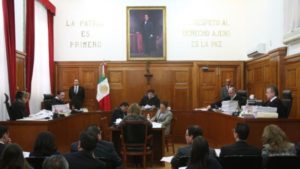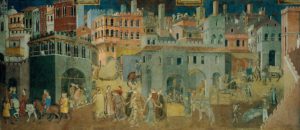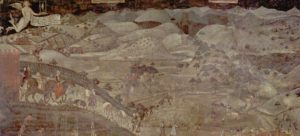Why Parmesan Cheese Is So Expensive
Video: FOOD INSIDER
Eclectic: Temas, eventos, cosas graciosas, recuerdos, suspicacias y otros mangos

Video: FOOD INSIDER
Video: Wall Street Journal
“La falta de transparencia y regulación han generado un mayor escrutinio en el mercado del arte a medida que las autoridades financieras descubren que este se ha convertido en la herramienta ideal para el lavado de dinero.
En una conferencia sobre arte (Art Business Conference) realizada el 12 de mayo de 2018 en Londres, el jefe de los servicios forenses y contra el lavado de dinero en Deloitte Luxemburgo, Michael Martin, señaló que ‘el arte figura entre las mas obvias clases de activos que se presta para el lavado de dinero’. Debido a ello, los reguladores financieros en Europa han empezado a controlar dicho mercado para hacerlo transparente y reducir su atractivo para los lavadores de dinero.
No existe un estimado concreto sobre las cantidades de dinero que es lavado a través del mercado del arte, aunque se especula que es enorme y se está expandiendo a medida que las regulaciones sobre otras clases de activos, desde bienes raíces a divisas, se han concretado en todas partes.
Sin embargo, el Fondo Monetario Internacional estimó que ‘la cantidad disponible para el lavado a través del sistema financiero’ representaba el 2,7 por ciento del producto interno bruto mundial en 2009 o $ 1.6 billones (EE.UU.).
Se cree que la relativa facilidad de lavado de fondos ilícitos a través de comerciantes de arte y casas de subastas ha contribuido a un aumento espectacular del valor del arte en los últimos años.
Hablando al margen de la Art Business Conference, Pierre Valentin, jefe de la división de derecho del arte en la firma de abogados Constantine Cannon de Londres, dijo que el lavado de fondos ilícitos a través del mercado del arte era seductor porque las compras en subastas ‘pueden ser anónimas y son un activo móvil. Puedes poner el arte en un avión privado y llevarlo a cualquier parte. Además, no hay un sistema de registro para el arte’.”
Lea la nota completa en: The link between art and money laundering
Traducción de fragmentos: arturodiazf
Video: CNN Business
Video: truTV

Imagen: https://www.telesurtv.net/__export/1542323361000/sites/telesur/img/multimedia/2018/11/15/8039262.jpg_1718483347.jpg
La Suprema Corte de Justicia de la Nación (SCJN) ordenó suspender la aplicación de la Ley Federal de Remuneraciones, en la cual se establece que ningún funcionario público puede ganar más que el presidente, de acuerdo con la propuesta de Andrés Manuel López Obrador (AMLO).
El ministro Alberto Pérez Dayán admitió a trámite la acción de inconstitucionalidad que tramitaron distintas fracciones parlamentarias en el Senado y dijo que la medida de suspensión no impide a los diputados incrementar o reducir los salarios como lo consideren.
Los diputados deberán dictaminar conforme a las reglas establecidas en la Constitución y observar que la misma indica que los salarios de Jueces, Magistrados y Ministros no pueden ser reducidos mientras duren en el encargo.
Lea mas en: noticiero.televisa
COMUNICADO N° 0008-2018-EF/50.01
A LOS PLIEGOS PRESUPUESTARIOS DEL SECTOR PÚBLICO
APLICACIÓN DE MEDIDAS SOBRE GASTO EN INGRESOS DEL PERSONAL
La Dirección General de Presupuesto Público del Ministerio de Economía y Finanzas en el marco de sus funciones establecidas en la Ley Nº 28411, Ley General del Sistema Nacional de Presupuesto; considerando las medidas de gasto establecidas en Ley Nº 30693, Ley de Presupuesto del Sector Público para el Año Fiscal 2018 (en adelante la Ley de Presupuesto 2018), encuentra necesario comunicar lo siguiente:
a) En concordancia con el artículo 6º de la Ley de Presupuesto 2018, la existencia de marco o saldos presupuestales en la Programación de Compromisos Anual en el Grupo Genérico de Gasto de Personal y Obligaciones Sociales o en cualquier otro Grupo Genérico de Gasto, por sí mismo, en ningún caso es sustento legal para otorgarse prestaciones, sean pecuniarias o en especie, tales como canastas, asignaciones, vales, bonos, bonificaciones, distribuciones, retribuciones, incentivos, estímulos, asignaciones extraordinarias, beneficios de cualquier naturaleza, cualquiera sea su denominación, forma, modalidad, periodicidad, mecanismo y fuente de financiamiento, incluido el incremento de los incentivos laborales que se otorgan a través del CAFAE.
b) En ese sentido, el otorgamiento de los conceptos antes señalados, que no hubieran contado con autorización expresa en una Ley, tanto en el presente año fiscal como en años anteriores, contraviene las prohibiciones establecidas en las Leyes Anuales de Presupuesto del Sector Público.
c) En el marco del artículo 4° de la Resolución Directoral N° 026-2017-EF/50.01, el uso de las partidas contempladas en los clasificadores presupuestarios, no convalida los actos o acciones que dichos pliegos realicen con inobservancia de los requisitos esenciales y formalidades impuestas por las normas legales, ni constituyen el sustento legal para la realización de operaciones de ingresos y gastos. Asimismo, los citados clasificadores presupuestarios, únicamente se utilizan para el registro de las transacciones que han sido contraídas por las entidades públicas en el marco de la normatividad vigente, orientadas al cumplimiento de sus tareas y/o funciones para la prestación de los servicios públicos, que legalmente les han sido encomendadas, para la consecución de sus objetivos y metas institucionales.
Por lo expuesto, se recuerda a las entidades del Gobierno Nacional, Gobiernos Regionales y Gobiernos Locales cumplir estrictamente con las normas antes señaladas, así como a sus Oficinas de Presupuesto, Administración, Abastecimiento y Tesorería, o las que hagan sus veces en las entidades, en el marco de su responsabilidad sobre el proceso de ejecución del gasto.
Finalmente, respecto a la legalidad de la ejecución presupuestaria, es menester hacer referencia al artículo 31º de la Ley Nº 28411, que dispone que la Contraloría General de la República y los Órganos de Control Institucional de las Entidades supervisan la legalidad de la ejecución del presupuesto público comprendiendo la correcta gestión y utilización de los recursos y bienes del Estado, según lo estipulado en la Ley Nº 27785, Ley Orgánica del Sistema Nacional de Control de la Contraloría General de la República.
Lima, 5 de diciembre de 2018
DIRECCIÓN GENERAL DE PRESUPUESTO PÚBLICO
1720699_1
En: elperuano

Image: Pintura mural “Alegoría del buen Gobierno” de Ambrogio Lorenzetti, ejecutada en la Sala de la Paz del Palacio Comunal de Siena.

Image: Pintura mural “Alegoría del buen Gobierno” de Ambrogio Lorenzetti, ejecutada en la Sala de la Paz del Palacio Comunal de Siena.

Image: El Mal Gobierno representado por la Tiranía en el centro. de Ambrogio Lorenzetti, ejecutada en la Sala de la Paz del Palacio Comunal de Siena.

Image: Los Efectos Positivos del Buen Gobierno en el Ambiente Rural. De Ambrogio Lorenzetti, ejecutada en la Sala de la Paz del Palacio Comunal de Siena.
Es usted un peruano con residencia legal en el extranjero? Esta usted preocupado por no poder ir a votar en el referendum del 9 de diciembre de 2018? No se preocupe, de acuerdo al artículo 4 de la Ley N° 28859, a los peruanos en el exterior no se les sancionará con multa la omisión de sufragio.
LEY QUE SUPRIME LAS RESTRICCIONES CIVILES, COMERCIALES, ADMINISTRATIVAS
Y JUDICIALES; Y REDUCE LAS MULTAS EN FAVOR DE LOS CIUDADANOS OMISOS
AL SUFRAGIO
LEY N. 28859
(PUBLICADA EL 3 DE AGOSTO DE 2006)
“(…) Artículo 4.- Reduce la multa por omisión de sufragio, fija multa por no asistir o negarse a integrar o desempeñar el cargo de miembro de mesa de sufragio y elimina la multa para los peruanos en el exterior
Redúcese la multa por omisión de sufragio de cuatro por ciento (4%) de la Unidad Impositiva Tributaria; y confírmase la multa de cinco por ciento (5%) por no asistir o negarse a integrar la mesa de sufragio y por negarse a desempeñar el cargo de miembro de mesa, a las sanciones que se sujeta el Cuadro de Aplicación de Multas Diferenciadas según Niveles de Pobreza a que se contrae el artículo 5 de la presente Ley.
Para los peruanos en el exterior no se les sancionará con multa a la omisión de sufragio pero sí se aplicará la multa prevista para los peruanos residentes en el Perú, señalados en los literales a, b y c del artículo siguiente, solamente en los rubros, no asistencia o negarse a integrar mesa de sufragio; o, negarse al desempeño del cargo de miembro de mesa. (…)”
En: LEY N. 28859 (PUBLICADA EL 3 DE AGOSTO DE 2006)
Según Mujica, el empresariado busca acordar una reforma laboral junto con el Gobierno, la cual pareciera disminuye los derechos ganados por los propios trabajadores
El Gobierno y el empresariado buscan consensuar una reforma laboral que en sus primeros anuncios disminuye derechos ganados por los trabajadores. Al respecto, Javier Neves advierte que sin un consenso tripartito se estaría alentando una situación de intensa crisis social, con movilizaciones y represión.
– ¿Cuál es su análisis sobre la reforma laboral planteada por el Ejecutivo?
El plan sostiene que la entrada y la salida de la relación laboral son rígidas y que los costos no salariales son muy altos. Propone flexibilizar las primeras y reducir los segundos. Pero resulta que la contratación temporal ya es muy flexible: hay once tipos de contratos recogidos en la ley, más una cláusula abierta que permite añadir otros. Algunos están deliberadamente mal perfilados, de modo que facilitan la evasión. Por ello, un 65% de trabajadores del sector privado formal cuenta con ese tipo de contratos. La fiscalización es manifiestamente insuficiente para detectar y sancionar esta situación. En la salida, hay muchas opciones de despido por causa justificada y la indemnización opera en la mayoría de los casos. Solo el 5,6% de las terminaciones de las relaciones laborales se deben a despidos.
– ¿Piensa usted que tendrá los resultados que se plantea?
Me parece incoherente que se pretenda fomentar la contratación de duración indefinida, manteniendo las permisivas reglas sobre la contratación de duración determinada. En todo caso, lo que tendría que proponerse es endurecer las reglas de la entrada y ablandar las de la salida, sustituyendo la reposición por la indemnización, salvo para el despido discriminatorio. De no hacer lo primero, el empleador seguirá prefiriendo la contratación temporal, ya que no renovar un contrato no conlleva indemnización alguna, mientras despedir sí. En el derecho comparado, cuando se ha dispuesto el reemplazo de la reposición por la indemnización, esta se ha incrementado. Nuestro gobierno propone rebajarla. Increíble.
– Productividad y competitividad, ¿cómo mejorar estos indicadores en el Perú? ¿La disminución de derechos laborales nos hará más competitivos?
Si nos atenemos a las denominaciones que se han otorgado a las leyes que han tenido ese propósito, veremos que no lo han conseguido. Ni la original Ley de Fomento del Empleo ni la siguiente Ley de Productividad y Competitividad Laboral, han logrado, pese a su intensiva flexibilización, fomentar el empleo formal. La disminución de derechos fundamentales no debe ser objeto de ensayos ni estos deben sacrificarse, porque se afectaría la dignidad de las personas. La productividad va a mejorar cuando tengamos una importante inversión en tecnología y capacitación.
– ¿Es realmente el Perú un país con altos sobrecostos laborales?
Se dice que en el régimen general los costos laborales no salariales ascienden al 54%. Es decir, por cada sol que paga el empleador, 54 céntimos serían costos no salariales. Incluyen entre estos, a las vacaciones y las gratificaciones, que son remuneraciones y representan gastos del 8,7 % y el 17,3%, respectivamente. Se les podría agregar la Compensación por Tiempo de Servicios (CTS), que es una remuneración diferida y significa un gasto del 10,1%. Con lo que los costos bajarían al 17,9%. Nos están haciendo trampa con las cifras. Lo que importa, en verdad, es la remuneración global y no sus componentes. En sendos cuadros publicados por La República podemos comprobar que el Perú tiene la remuneración mínima más baja y la canasta básica por persona más alta de la región. Allí, no proponen igualarnos. Solo lo quieren para la baja.
– ¿Cómo entender una reforma laboral que se plantea no desde el ente rector (MTPE) sino desde el Ministerio de Economía y en paralelo desde el sector privado?
Pienso que no podemos negarle al Ministerio de Economía, cuya competencia es transversal a los otros sectores, la iniciativa de reformas laborales. Lo que no puede aceptarse es que el Gobierno pretenda imponerlas unilateralmente. Es indispensable buscar el consenso político y social. El escenario para este último es el Consejo Nacional del Trabajo. Si se prescindiera de dicho consenso, el riesgo de protestas y movilizaciones sindicales y juveniles, sería muy alto. Recordemos que, según la encuesta de Ipsos, los jóvenes manifiestan que no estarían dispuestos a reducir las gratificaciones (91%), la CTS (87%) ni las vacaciones (78%), para obtener un empleo formal.
– ¿Ve conveniente la salida del exministro Sánchez?¿Qué podría desencadenar esto y tener un ministro con otro perfil?
Hay, en mi opinión, dos valores contrapuestos, que son los de la unidad y la diversidad de criterios. En todos los gobiernos desde Fujimori hasta hoy, por lo menos en sus inicios, han habido gabinetes con miembros de ideas variadas, que luego se fueron decantando hacia la unidad conceptual. Me parece más conveniente la pluralidad, siempre que se maneje internamente. Cuando fui ministro de Trabajo tuve también un debate público con el de Economía. La diferencia es que el presidente del Consejo de Ministros y el propio presidente de la República zanjaron entonces la discusión sosteniendo que no habría reforma. Ahora ha sido al revés, por lo que el ministro de Trabajo no ha tenido otra opción que la renuncia. Se pierde un ministro y un equipo de alta calidad intelectual y moral.
– ¿Cuál sería el costo político para el gobierno de Martín Vizcarra si continúa impulsando esta reforma laboral?
Creo que el impulso a la reforma laboral de degradación de derechos va a tener un alto costo político y social. El apoyo del empresariado en esa dirección me parece muy irresponsable. Podría estarse alentando una situación de intensa crisis social, con movilizaciones y represión, y evidentes consecuencias políticas, que la oposición aprovecharía.
– ¿Por dónde piensa usted que pase una verdadera reforma laboral y, en ese sentido, qué rol debería tener allí el CNT?
Me parece un buen avance que el Consejo Nacional del Trabajo, que es el espacio apropiado para el debate, haya aprobado por unanimidad sobre la modificación de cualquier norma laboral, ya fuera de mejora, ya fuera de disminución, pero especialmente en este último caso, dada la conflictividad que supone.
– ¿En qué terminará la discusión de no permitir los incrementos salariales en el Estado?
Me parece inconcebible que el Gobierno vaya a observar la Ley sobre Negociación Colectiva en el Estado, que ha sido reclamada por el Tribunal Constitucional y aprobada por amplio acuerdo político en el Congreso. No se puede continuar jurídicamente con la prohibición de negociar remuneraciones, porque resulta incompatible con la Constitución y el Convenio 98 de la Organización Internacional del Trabajo. Peor aún, es que se siga manteniendo en la Ley de Presupuesto el impedimento de negociar beneficios económicos condenado por el Tribunal Constitucional y el Comité de Libertad Sindical. A mi juicio, habiendo vencido largamente la vigencia diferida que el Tribunal Constitucional le otorgó a sus sentencias sobre la Ley de Presupuesto y la del Servicio Civil, estas son hoy plenamente aplicables.
En: larepublica
DECRETO SUPREMO
Nº 280-2018-EF
EL PRESIDENTE DE LA REPÚBLICA
CONSIDERANDO:
Que, el párrafo 2 de la Quinta Disposición Transitoria de la Ley N° 28411, Ley General del Sistema Nacional de Presupuesto, establece que a través de la Ley Anual de Presupuesto del Sector Público se fija, entre otros conceptos, el monto del Aguinaldo por Navidad que se otorga a los funcionarios, servidores, obreros, personal sujeto a Carreras reguladas por Leyes específicas, así como a los pensionistas del Sector Público, para lo cual en cada año fiscal será reglamentado mediante decreto supremo refrendado por el Ministro de Economía y Finanzas;
Que, el literal a) del párrafo 7.1 del artículo 7 de la Ley N° 30693, Ley de Presupuesto del Sector Público para el Año Fiscal 2018, fija el Aguinaldo por Navidad hasta por la suma de S/ 300,00 (TRESCIENTOS Y 00/100 SOLES), a favor de los funcionarios y servidores nombrados y contratados bajo el régimen del Decreto Legislativo N° 276 y la Ley N° 29944; los docentes universitarios a los que se refiere la Ley N° 30220; el personal de la salud al que se refiere el párrafo 3.2 del artículo 3 del Decreto Legislativo N° 1153; los obreros permanentes y eventuales del Sector Público; el personal de las Fuerzas Armadas y de la Policía Nacional del Perú; y los pensionistas a cargo del Estado comprendidos en los regímenes de la Ley N° 15117, los Decretos Leyes N° 19846 y N° 20530, el Decreto Supremo N° 051-88-PCM y la Ley N° 28091, disponiendo, a su vez, que dicho Aguinaldo se incluye en la planilla de pagos del mes de diciembre del presente año;
Que, asimismo, el párrafo 7.3 del artículo 7 establece que los trabajadores contratados bajo el Régimen Laboral Especial del Decreto Legislativo N° 1057, en el marco de la Ley N° 29849, perciben por concepto de Aguinaldo por Navidad, que se incluye en la planilla de pagos correspondiente a diciembre, hasta el monto al que hace referencia el literal a) del párrafo 7.1 del artículo 7 de la Ley N° 30693;
Que, en la Ley N° 30693, se han consignado recursos en los presupuestos institucionales de las entidades públicas para el otorgamiento del Aguinaldo por Navidad, por lo que resulta necesario dictar normas reglamentarias para que dichas entidades puedan efectuar adecuadamente las acciones administrativas pertinentes en el marco de la citada ley;
De conformidad con lo establecido en el párrafo 8 del artículo 118 de la Constitución Política del Perú; en la Ley N° 30693, Ley de Presupuesto del Sector Público para el Año Fiscal 2018; en el párrafo 2 de la Quinta Disposición Transitoria de la Ley N° 28411, Ley General del Sistema Nacional de Presupuesto; en el párrafo 3 del artículo 11 de la Ley N° 29158, Ley Orgánica del Poder Ejecutivo; y, la Ley N° 29849, Ley que establece la eliminación progresiva del Régimen Especial del Decreto Legislativo N° 1057 y otorga derechos laborales;
DECRETA:
Artículo 1. Objeto
El presente Decreto Supremo tiene por objeto establecer disposiciones reglamentarias para el otorgamiento del Aguinaldo por Navidad cuyo monto fijado por la Ley N° 30693, Ley de Presupuesto del Sector Público para el Año Fiscal 2018, corresponde hasta por la suma de S/ 300,00 (TRESCIENTOS Y 00/100 SOLES), que se abona, por única vez, en la planilla de pagos del mes de diciembre de 2018.
Artículo 2. Alcance
2.1 En el marco de lo establecido en el literal a) del párrafo 7.1 del artículo 7 de la Ley N° 30693, el Aguinaldo por Navidad se otorga a favor de los funcionarios y servidores nombrados y contratados bajo el régimen del Decreto Legislativo N° 276 y la Ley N° 29944; los docentes universitarios a los que se refiere la Ley N° 30220; el personal de la salud al que se refiere el párrafo 3.2 del artículo 3 del Decreto Legislativo N° 1153; los obreros permanentes y eventuales del Sector Público; el personal de las Fuerzas Armadas y de la Policía Nacional del Perú; y los pensionistas a cargo del Estado comprendidos en los regímenes de la Ley N° 15117, los Decretos Leyes N° 19846 y N° 20530, el Decreto Supremo N° 051-88-PCM y la Ley N° 28091.
2.2 De acuerdo a lo dispuesto por el párrafo 7.3 del artículo 7 de la Ley N° 30693, los trabajadores contratados bajo el Régimen Laboral Especial del Decreto Legislativo N° 1057, en el marco de la Ley N° 29849, perciben por concepto de Aguinaldo por Navidad, que se incluye en la planilla de pagos correspondiente a diciembre, hasta el monto al que hace referencia el literal a) del párrafo 7.1 del artículo 7 de la mencionada ley.
Artículo 3. Financiamiento
3.1 Dispóngase que el Aguinaldo por Navidad fijado en S/ 300,00 (TRESCIENTOS Y 00/100 SOLES) por el literal a) del párrafo 7.1 del artículo 7 de la Ley N° 30693 se financia con cargo a los créditos presupuestarios asignados en el presupuesto institucional de las entidades públicas.
3.2 Conforme a lo establecido en el párrafo 7.3 del artículo 7 de la Ley N° 30693, los trabajadores contratados bajo la modalidad especial del Decreto Legislativo N° 1057, en el marco de la Ley N° 29849, perciben por concepto de Aguinaldo por Navidad, que se incluyen en la planilla de pagos correspondiente a diciembre, hasta el monto al que hace referencia el literal a) del párrafo 7.1 del artículo 7 de la Ley N° 30693 lo que se financia con cargo a los créditos presupuestarios asignados en el presupuesto institucional de las entidades públicas.
3.3 En el caso de los Gobiernos Locales, el Aguinaldo por Navidad es otorgado hasta por el monto fijado en el literal a) del párrafo 7.1 del artículo 7 de la Ley N° 30693 y se financia con cargo a sus respectivos ingresos corrientes, de acuerdo a lo señalado en el párrafo 2) de la Cuarta Disposición Transitoria de la Ley N° 28411, Ley General del Sistema Nacional de Presupuesto, y en función a la disponibilidad de los recursos que administran.
3.4 Los organismos comprendidos en el alcance del párrafo 2.1 del artículo 2 de la presente norma, que financian sus planillas con una Fuente de Financiamiento distinta a la de Recursos Ordinarios, otorgan el Aguinaldo por Navidad hasta por el monto que señala el literal a) del párrafo 7.1 del artículo 7 de la Ley N° 30693 y en función a la disponibilidad de los recursos que administran.
Artículo 4. Requisitos para la percepción
El personal señalado en el artículo 2 del presente Decreto Supremo tendrá derecho a percibir el Aguinaldo por Navidad, siempre que cumpla de manera conjunta con las siguientes condiciones:
a) Haber estado laborando al 30 de noviembre del presente año, o en uso del descanso vacacional, o de licencia con goce de remuneraciones o percibiendo los subsidios a que se refiere la Ley N° 26790, Ley de Modernización de la Seguridad Social en Salud.
b) Contar en el servicio con una antigüedad no menor de tres (03) meses al 30 de noviembre del presente año. Si no contara con el referido tiempo de tres (03) meses, dicho beneficio se abona en forma proporcional a los meses laborados.
Artículo 5. De la percepción
5.1 Los funcionarios, servidores y pensionistas de la Administración Pública reciben el Aguinaldo por Navidad en una sola repartición pública, debiendo ser otorgada en aquella que abona los incrementos por costo de vida.
5.2 El Aguinaldo por Navidad no constituye base de cálculo para el reajuste de cualquier tipo de remuneración, bonificación, beneficio o pensión.
Artículo 6. Incompatibilidades
La percepción del Aguinaldo por Navidad dispuesto por la Ley N° 30693, es incompatible con la percepción de cualquier otro beneficio en especie o dinerario de naturaleza similar que, con igual o diferente denominación, otorga la entidad pública, independientemente de la fecha de su percepción dentro del presente año fiscal.
Artículo 7. Aguinaldo por Navidad para el Magisterio Nacional y labor en jornada parcial o incompleta
7.1. Para el Magisterio Nacional, el Aguinaldo por Navidad se calcula de acuerdo a lo previsto en la Ley N° 29944, Ley de Reforma Magisterial, otorgándose a los docentes con jornada laboral completa un monto no menor al señalado en el literal a) del párrafo 7.1 del artículo 7 de la Ley N° 30693, en el marco de lo dispuesto por los párrafos 1 y 2 de la Quinta Disposición Transitoria de la Ley N° 28411, Ley General del Sistema Nacional de Presupuesto, y la Ley N° 29944, Ley de Reforma Magisterial.
7.2. Para el caso de los servidores comprendidos en regímenes de carrera propia que laboran a tiempo parcial o jornada laboral incompleta, el Aguinaldo por Navidad es de aplicación proporcional a su similar que labora a tiempo completo, bajo responsabilidad del Jefe de la Oficina de Administración o el que haga sus veces de la entidad respectiva.
Artículo 8. Proyectos de ejecución presupuestaria directa
El Aguinaldo por Navidad es de aplicación a los trabajadores que prestan servicios personales en los proyectos de ejecución presupuestaria directa a cargo del Estado; para tal efecto, el egreso se financia con cargo al presupuesto de los proyectos respectivos.
Artículo 9. Aguinaldo para los Internos de Medicina Humana y Odontología
El personal a que se refiere el artículo 1 del Decreto Supremo N° 020-2002-EF recibirá de Aguinaldo por Navidad la suma de S/ 100,00 (CIEN Y 00/100 SOLES), debiendo afectarse en la partida de gasto 2.1.1 3.1 4 Internos de Medicina y Odontología del Clasificador de Gastos. El Aguinaldo a que se refiere el presente artículo no está afecto a cargas sociales.
Artículo 10. De las Aportaciones, Contribuciones y Descuentos
Las aportaciones, contribuciones y descuentos que se aplican al Aguinaldo por Navidad, se sujetan a lo dispuesto en el artículo 2 de la Ley N° 30334, Ley que establece medidas para dinamizar la economía en el año 2015.
Artículo 11. Régimen Laboral de la Actividad Privada
Los trabajadores del Sector Público que se encuentran bajo el régimen laboral de la actividad privada se sujetan a lo establecido por la Ley N° 27735, Ley que regula el otorgamiento de las gratificaciones para los trabajadores del régimen de la actividad privada por Fiestas Patrias y Navidad, para la percepción de las gratificaciones correspondientes por Navidad.
Asimismo, no están comprendidas en los alcances de los artículos 2 y 8 del presente Decreto Supremo las entidades sujetas al régimen laboral de la actividad privada, que por dispositivo legal o negociación colectiva, vienen otorgando montos por concepto de gratificación con igual o diferente denominación, bajo responsabilidad de los Directores Generales de Administración o de quienes hagan sus veces.
Artículo 12. Disposiciones complementarias para la aplicación del Aguinaldo por Navidad
12.1 Las entidades públicas que habitualmente otorguen el Aguinaldo por Navidad, independientemente de su régimen laboral, no podrán fijar montos superiores al establecido en el literal a) del párrafo 7.1 del artículo 7 de la Ley N° 30693, bajo responsabilidad del Jefe de la Oficina General de Administración o quien haga sus veces, salvo que sea de aplicación el supuesto regulado en el párrafo 7.2 del artículo 7 de la citada ley.
12.2 El Ministerio de Economía y Finanzas, en caso fuera necesario, queda autorizado a dictar las disposiciones complementarias para la correcta aplicación de la presente norma.
Artículo 13. De la suspensión de normas
Déjese en suspenso las disposiciones legales que se opongan a lo establecido en la presente norma o limiten su aplicación.
Artículo 14. Refrendo
El presente Decreto Supremo es refrendado por el Ministro de Economía y Finanzas.
Dado en la Casa de Gobierno, en Lima, a los veintinueve días del mes de noviembre del año dos mil dieciocho.
MARTÍN ALBERTO VIZCARRA CORNEJO
Presidente de la República
CARLOS OLIVA NEYRA
Ministro de Economía y Finanzas
Video: Kai47